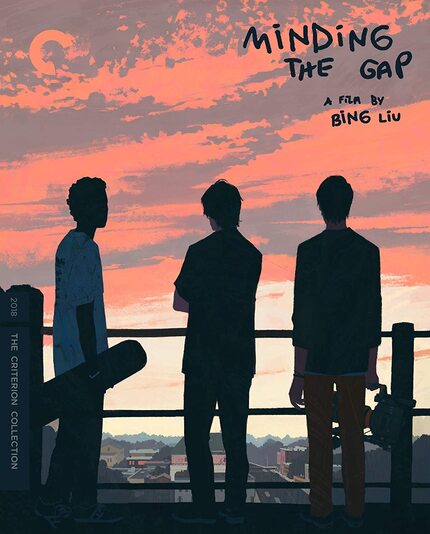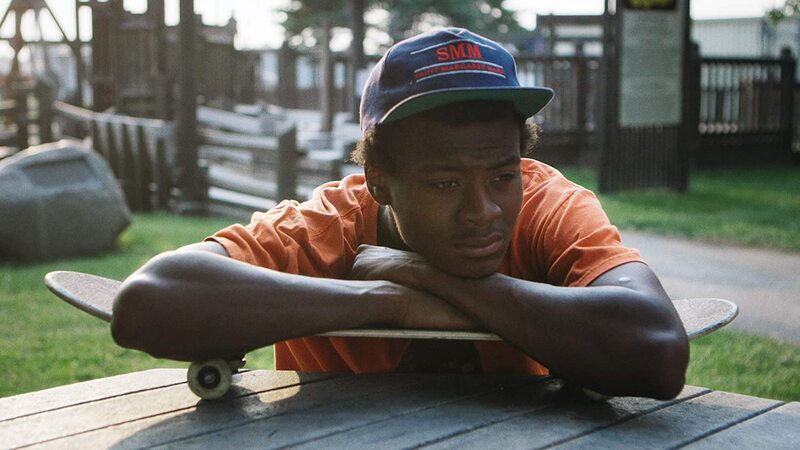Blu-ray Review: Criterion's MINDING THE GAP Goes Airborne
Bing Liu's Oscar nominated skater film arrives on Blu-ray, featuring a bonus interview with Tony Hawk.

In February of 2019, a trio of disheveled young men put up their skateboards, threw on tuxedos, and attended the 91st Academy Awards. Their film, nominated for Best Documentary Feature, the compelling and heartbreaking Minding the Gap, interweaves their personal stories.
Expertly incorporating footage shot over the course of more than ten years, filmmaker Bing Liu’s final assembly resonates as a truly raw portrayal of growing up in a go-nowhere Rust Belt dot on the map. (Rockford, Illinois to be specific). The three misfits at the center of the film are verbose: the floppy-haired roofer and new dad Zack Mulligan, the reserved but personable Keire Johnson, and the director himself.
Though at first Minding the Gap is seemingly just another skateboarding doc stocked with rebellious outsiders, the film quickly veers effectively into uncharted emotional territory. Much has been made of its notion of “skateboarding as a means of survival”. While that’s not an inaccurate read on Minding the Gap, the sport is not what it’s all about. Skateboarding is, though, the very real jumping-off point for Bing. And by the end, it utterly destroys; painful intimacy played out as epic reality. Though not a long film, by this point we know and care for all of the individuals.
As the guys age into skating more and more infrequently, when they do hop onto a board to transverse the downtown concrete, the camera glides right along with them. For them, it’s a controlled drift that can only be had here. Grinding, rolling tranquility.
The increasingly destitute hometown of Rockford is of particular importance; its landscape dotted with p.s.a. billboards about the importance of fatherhood and what a father is. As true as they may be, the signs read as lonely and strained windsails on their own bleak horizon. They are a subtle reminder of what’s missing in the lives of Bing, Kiere and Zack -- and in the latter case, what’s about to advance cyclically.
Bing is, over time and through the fabric of the film itself, revealed to be a storyteller of true astute empathy. As he posits in an introduction to one of his deleted scenes included on the disc, "When is a story like this ever over?" It never really is, of course. Criterion, in preparing bonus features for this release, demonstrates a keen understanding of this, as most of the wealth of what’s provided is dedicated to catching up with the crew.
Bing himself is front and center in the supplements, be they newly created interviews and commentaries or an older short film he made apart from Minding the Gap. (That would be 2010’s Nước). Although these are COVID-19-era bonus features, lengths have been taken to elevate them beyond being glorified Zoom calls. All is in service of a glorious transfer that could not have been easy to confirm, considering the film’s wealth of old footage scattered across different video formats.
Everyone has grown up now, settled down and looking traditionally "respectable." This is especially evident in Bing’s recent remote conversation with Nina, who has moved into a considerably more stable phase of life. Bing himself radiates sensitive auteur professionalism, evident all the while in the film itself but made explicit here. Here’s hoping his announced transition into narrative filmmaking s great work and great experiences for him.
The filmmaker’s two commentary tracks present him in varying lights. The first is a joint effort with all the young dudes. It’s unserious for the longest time as they shoot the bull as the movie unspools. Eventually, there can’t help but be serious moments of actual conversation. On the whole, however, the track serves as a reassurance amid a very dramatic film that friendship can continue despite time, distance, and the documentary treatment.
Skating legend Tony Hawk, in a 12-minute interview, credits Bing with breaking new ground in the realm of the typically closed-off and limited niche of skateboarding documentaries. His appreciation of Bing’s willingness to go deep in terms of typically ultra-off-limits areas such as abusive home lives and navigating the increasing responsibilities of life is not mere lip service. Hawk clearly was as immersed by this tale just as anyone else would be. "You can tell that the movie is shot by a skater, and that Bing used his experience and technique to bring a documentary to life." To life, and he really means that. "It’s gripping, it’s fascinating, it’s heartbreaking. And I had to know more."
Bing’s film, as magnetically wrenching as it is, lost out at the Oscars to Jimmy Chin and Elizabeth Chai Vasarhelyi’s popular and admittedly breathtaking Free Solo. Those who’d seen Minding the Gap widely proclaimed that an injustice had been done. It is, after all, not just a portrait of systemic poverty or even a true-life character study, but a merciful act of healing -- and one that genuinely shreds. The slogan written on Kiere’s board could just as easily apply to Bing’s camera: "This device cures heartache."
Minding the Gap
Director(s)
- Bing Liu
Cast
- Keire Johnson
- Bing Liu
- Zack Mulligan








